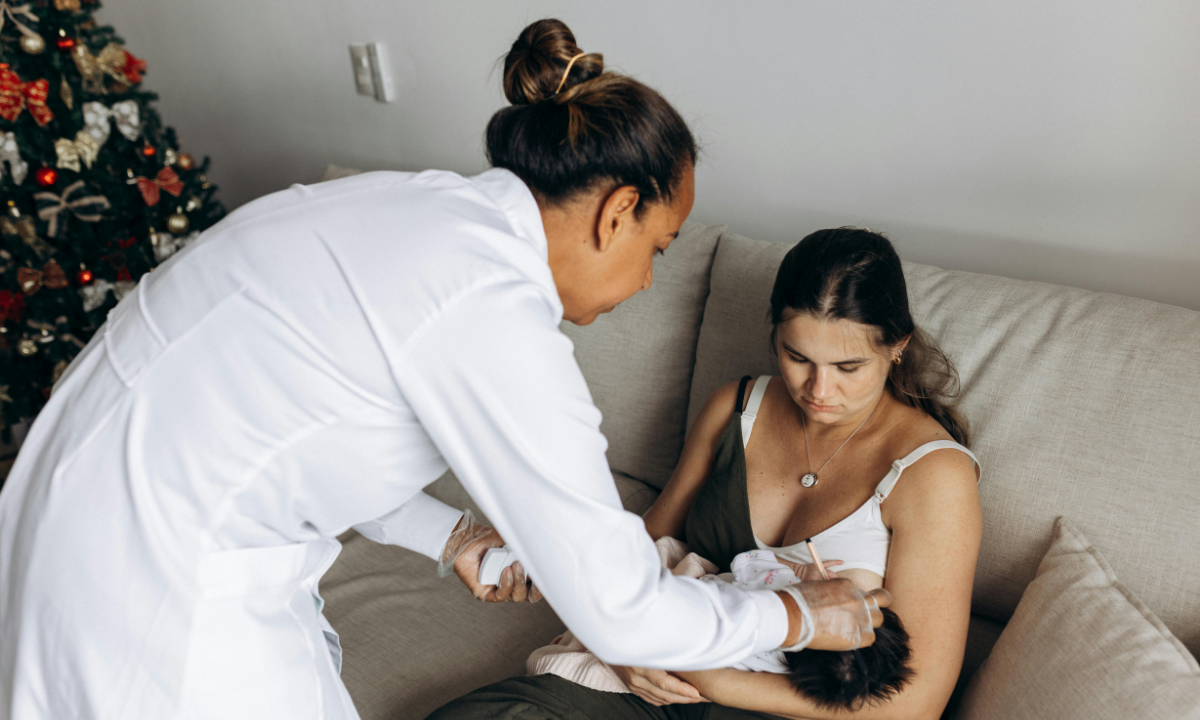After months of pregnancy and adjusting to life as a parent, it's normal for the intimacy that once felt natural to now seem challenging. Moreover, with a newborn to care for, both you and your partner may find yourselves busier than ever.
However, did you know? Being intimate after giving birth can support both your physical and emotional well-being. Intimacy can help you and your partner get closer and strengthen your bond as you navigate parenthood together.
When can you have sex after giving birth?
Most healthcare providers recommend that you shouldn't have sexual activity for at least four to six weeks after giving birth. This is because your body is still recovering. Within the first weeks, your uterus (womb) is still getting smaller, your cervix (lower part of the womb) is closing, and the vaginal bleeding (called lochia) is slowly decreasing.
So, if you have intercourse too soon, your body won’t be fully healed, which increases the risk of infection or bleeding. However, timing can vary for each couple, depending on delivery type and your overall well-being.
Vaginal delivery:
After 4 to 6 weeks, you can normally have intercourse again if your recovery goes well.
Wait until the bleeding stops and any stitches from an episiotomy (a cut in the area between the vagina and anus) or tear have completely healed.
Caesarean section (C-section):
The wait time is usually the same but can be a little longer since the surgical wound may take longer to heal.
Remember that every recovery is different. Pay attention to your body and only resume intimacy when you feel ready.
Why you may need to wait before having intercourse post-birth

Your body goes through many changes during childbirth that take time to get back to normal:
Changes in the vagina:
Vaginal tissues may be swollen, sore, or dry, especially after vaginal birth.
C-section recovery:
If you had a C-section, you may find sexual activity uncomfortable due to abdominal discomfort and the healing of the incision.
Biological changes:
Hormonal changes and breastfeeding can lower libido and reduce natural lubrication.
Emotional overwhelm:
Stress, fatigue, and the demands of caring for a newborn can make intimacy feel difficult.
You don’t need to jump right back into your old routine. You’ve just been through something incredible—take some time to rest and recover, both physically and emotionally.
If you’re wondering when the right time to be intimate again is, trust your body’s signals and consult with a healthcare provider. Schedule an appointment with Thomson Medical to get personalised guidance for your post-birth recovery and the timing of when you can have intercourse again.
What sexual intercourse feels like after giving birth
After having a baby, your sexual life can feel very different than before. For some people, it might feel a little strange or mildly painful. Others may find it more tolerable as their bodies adapt. You might notice:
Dryness in the vagina:
Low oestrogen levels, especially during breastfeeding, may make your vagina drier.
Sensitivity:
The external area of your vagina (vulva) may still be tender or swollen, making penetration uncomfortable.
Tightness or looseness:
The pelvic floor muscles may be tight or weak after childbirth, affecting movement.
It might feel strange at first, but if you take things slowly and give yourself care and patience, it can become an important step in your recovery.
Common challenges with sex after giving birth
Many women find it difficult to resume intimacy after childbirth, and that’s totally normal. Here are some common challenges and how to overcome them:
| Challenge | Cause | Impact | How to manage it |
|---|---|---|---|
Hormonal changes after birth, especially during breastfeeding | Reduced natural lubrication, making sexual intercourse uncomfortable | Use lubricants during intercourse and take things slowly. Stop immediately when you feel pain | |
Unhealed surgical wounds or muscles | Healing from C-section scars or episiotomy | Discomfort or pain during intercourse | Wait until fully healed, communicate with your partner, and begin light Kegel exercises to strengthen pelvic muscles once your doctor approves |
Perineal pain | Vaginal tears, episiotomy, or stretched muscles | Pain in the area between the anus and genitals | Take breaks, use positions that reduce pressure, apply warm compresses if advised |
Post-birth mood changes | Post-birth changes in hormone levels | Affects libido and readiness for intimacy | Attending counseling or support groups, practicing mindfulness, and have an open communication with your partner |
Stress from caring for a newborn | Fatigue, sleep deprivation, and other daily responsibilities | Decreased sexual interest | Get enough rest, maintain healthy habits |
Body image insecurities | Post-birth adjustments | Reduced confidence and sex drive | Practice self-care and positive self-talk |
Our O&G specialists
Loading...
When to see a doctor about post-birth intercourse issues

If you’ve waited the recommended time but still feel pain or discomfort during sexual intercourse, it’s worth checking in with your healthcare provider. Occasionally, these signs point to hormonal issues, infection, or pelvic floor problems, so you should also see a doctor if you experience:
Sharp or persistent pain during intercourse
Severe vaginal dryness that doesn't improve with lubricant
Lack of sexual desire that lasts for months
Signs of infection
Rebuilding intimacy after childbirth
Sexual activity isn’t the only way to reconnect after having a baby. In this new stage, it’s also about emotional connection. Here are a few gentle ways to rebuild closeness with your partner:
Talk about it:
Share your feelings, whether it’s fear, insecurity, or fatigue. Honesty keeps you emotionally close.
Start small:
Physical touch without pressures like hugs, cuddling, or massages help rebuild trust and warmth.
Instead of penetrative intercourse, try other activities that excite you and your partner, such as oral intercourse.
Be patient:
Both of you are adjusting to a new life. Give each other time.
Support each other:
Sharing baby care and chores reduces stress and makes intimacy easier.
Give love space:
Intimacy isn’t about how often you have sexual intercourse; it’s about feeling seen and cared for.
When you’re ready, sexual activity can become a celebration of your relationship rather than feel like an obligation. If you’re unsure when it’s safe to resume sex or need guidance, schedule an appointment with a Thomson Medical specialist for professional support.
FAQ
Can you get pregnant soon after giving birth?
Yes. Ovulation can occur before your first post-birth period, so pregnancy is possible. If you are not planning another pregnancy right away, it’s important to discuss birth control with your doctor and choose a method that suits your recovery and breastfeeding status.
Is three weeks after birth too soon for sex?
Yes. Most people need at least four to six weeks to heal from vaginal tears, episiotomy, or C-section wounds. Engaging in sexual activity too early can increase infection risk and delay healing. However, individual recovery periods may vary so consult your doctor before resuming intimacy.
Why is intercourse painful after giving birth?
Pain during sexual activity after childbirth is common and can result from several factors:
Swollen or dry vaginal tissues due to hormonal changes and breastfeeding
Stitches from tears or episiotomies
Abdominal or pelvic soreness
Stress, anxiety, or body image concerns
Using lubrication, taking things slowly, and open communication with your partner can help reduce discomfort.
Do I need contraception even if I haven’t had my period yet?
Yes, contraception is recommended if you want to avoid another pregnancy, even before your menstrual periods resume. Ovulation may happen even before your first period after childbirth, which means you can still get pregnant.
How can I boost my libido after having a baby?
Physical healing, hormones, fatigue, and emotional changes affect libido. Boosting your sex drive often involves:
Self-care
Adequate rest
Gentle exercise
Emotional intimacy with your partner
Consultation with your healthcare provider
What is the best way to have sexual intercourse after a baby?
Comfort is key. Many women find that positions that allow control over depth and angle, such as side-lying, woman-on-top, or rear-entry positions, can reduce discomfort. Using pillows for support and ensuring lubrication can also make intercourse more comfortable.
It’s important to do it gently and communicate openly with your partner about what’s comfortable for you.
Does intercourse feel different after childbirth?
Yes, sexual intercourse can feel different after childbirth. Some women experience reduced vaginal tightness, increased sensitivity, or dryness due to hormonal changes and breastfeeding. Emotional factors, fatigue, and stress can also influence arousal and sensation.
Over time, your body will adapt, and many women regain pleasurable sexual experiences. Patience, open communication, and gradually rebuilding intimacy help ease the transition back to satisfying sexual activity.
The information provided is intended for general guidance only and should not be considered medical advice. For personalised recommendations and tailored advice based on your unique situations, please consult a specialist at Thomson Medical. Schedule an appointment with Thomson Medical today.
For more information, contact us:
Thomson Specialists (Women's Health)
Thomson Women's Clinic (TWC)
- Novena:
6592 6686 (Call), 8611 8986 (WA) - Bukit Batok:
6569 0668 (Call), 8686 3525 (WA) - Choa Chu Kang:
6893 1227 (Call), 8282 1796 (WA) Jurong:
6262 8588 (Call), 6262 8588 (WA)- Katong (female doctor):
6970 2272 (Call), 8611 9020 (WA) - Punggol:
6243 6843 (Call), 8811 0328 (WA) - Sembawang: 6753 5228
- Sengkang: 6388 8125
- Serangoon (female doctor): 6382 3313
- Tampines: 6857 6266
- Tiong Bahru: 6276 1525
